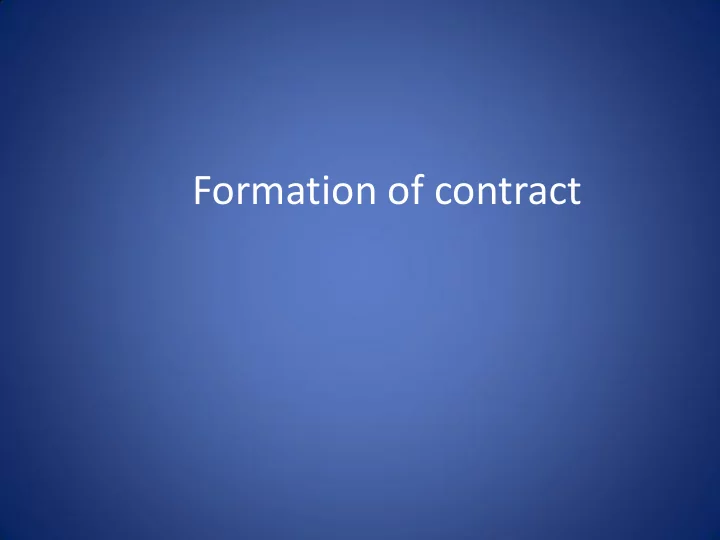

Formation of contract
Structuring the agreement . Essentials to be kept before drafting an agreement. Relevant clauses of the agreement. 1. Preamble. 2. Interpretation and definitions. 3. Scope of the works. 4. Price 5. Payment terms. 6. Scheduled Delivery Date. 7. Liquidated damages 8. Taxes and duties. 9. Confidentiality.
10. Indemnity. 11. Waiver 12. Amendments. 13. Force majeure. 14. Termination. 15. Dispute Resolution/Arbitration. 16. Jurisdiction. 17. Validity. 18. Notices.
IDENTIFICATION OF RISK • Estimation of the probable risk • Projected impact of the risk • Transfer of risk. • Mechanisms for losses that are beyond the declared risk tolerances.
ALLOCATION OF RISK • Risk transfer is the mode by which we shift the risk liability from one party to another by different modes.
METHODS • Indemnification • Limiting the Liability • Insurance • Waiver of Subrogation
Policy for Risk Management in Contracts Entering into contracts entails many risks. Taking precaution in managing these risks can protect the organization from losses. All organizations should have a written policy for risk management.
• All contracts must be written. • The authority to negotiate and sign contracts should be incorporated in the policy depending upon the quantum of the contract/transaction/financial exposure. • Requirement of review to minimize the risk prior to acceptance/signing. • Ensure that the probable risks are covered under the indemnities.
• Maintaining catalogue of all contracts to be maintained; • Maintaining separate register for various time lines in each contract, their date of expiry and the validity/expiry of the Bank/Performance Guarantees. • Making a schedule for periodic review of the contract for performance and risk management issues; • Formulating archiving procedures for expired contracts.
• Delegation powers to negotiate and sign the contract relating to commercial transactions be specified. • Ensure that the obligations under the contract and the risks associated with those obligations are complied with. • Employees responsible for contract negotiation should receive instruction or training on how to effectively review a contract.
Supply Contract: Essential Features An agreement by which a seller promises to supply all of the specified goods or services that a buyer needs over a certain time and at a fixed price, and the buyer agrees to purchase such goods or services exclusively from the seller during that time. In international market a supply contract is often necessary in order to lock in discounted pricing and other benefits that the supplier is agreeing to provide to the client for a specific period of time. The terms of a supply contract often define everything from the means whereby the products are delivered, terms of payment, and any other aspect of the relationship that the two parties have determined to be necessary. The supply contract protects the rights of the parties. The client knows what to expect in terms of the goods received and how they will be delivered. In turn, the supplier knows what the client is likely to need and how payment will be submitted.
Rate Contract: Distinctive Features. Rate ate con contracts racts are are mutual agreements between the buyer and the seller to operate a set of chosen items, during a given period of time, for a fixed price or price variation. Under this system the rates are fixed and at times even the quantity of the selected items. As and when the need arises the buyer issues a Purchase order directly on the basis of the rate chart available on the supplier who in turn supplies the items
Consultancy Services Contracts. A co cons nsult ultanc ancy co contr ntrac act is a legal ag agree eemen ment between a co cons nsul ultan tant and a client, by means of which the client buys the services of the co cons nsul ultan tant. It is a type of services agreemen ent.
DIFFERENCE BETWEEN RUNNING CONTRACT AND RATE CONTRACT The Running Contract is one under which, during the period of its currency the contractor engages to supply, and the other party to the contract to take, a specified quantity (with a percentage tolerance either way) of materials, as and when ordered, at fixed unit rates or prices, within a given period of the receipt of such order.
Recommend
More recommend